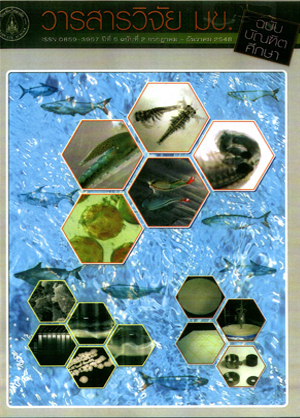ผลกระทบของการไปรับจ้างทำงานต่างประเหศต่อสุขภาพ เศรษฐกิจ และสังคมของแรงงานและครอบครัวในอำเภอเพ็ญ จังหวัดอุดรธานี Impact of Migration on Health and Socioeconomic StatusOf Thai Laborers and Their Families from Phen District, Udon Thani Province
Keywords:
Impact, MigrationAbstract
การวิจัยค'รงนี้เอนการ่วิจัยพิง'พรรณ'ามีวัตถุประสงค์!.พี่อ'ศึกษาสภาพการณ์การไบัรับจ้า-งทำงาน1พ่-างประเทศ ของแรงงานในอำเภอเพ็ญ จังหวัดอุดรธานี และศึกษาผลกระทบจากการไปรับจ้างทำงุานต่างประเท^ ทั้งทางด้านสุขภาพ ด้านเศรษฐกิจ และด้านสังคม ต่อแรงงานและครอบครัว กลุ่มตัวอย่างเนีนแรงงานท เคยเดินทางไปรับจ้างทำงานต่างประเทศในระหว่าง พ.ศ. 2540 - 2545 จำนวน 70 คนและตัวแทนครอบครัว แรงงานจำนวน 70 คนโดยศึกษาในหมู่บานที่มีแรงงานเดินทางไปรับจ้างทำงาน ต่างประเทศจำนวนมาก 3 หมูบาน ใน ต.เชียงหวาง อ.เพ็ญ จ.อุดรธานี เก็บรวบรวมข้อมูล โดยใข้แบบสัมภาษณ 2 ชุด ชุดที่ 1 แบบสัมภาษณ์ แรงงาน ชุดที่ 2 แบบสมภาษณ์ตัวแทนครอบครัวแรงงาน เก็บข้อมูลระหว่างเดือน กรก(ทศม ถึงุเดือนสิงหาคม 2547 วิเคราะห์ข้อมูลส่วนที่เนีนข้อมูลเชิงปริมาณโดกการแจกแจงความถ ร้0ยละ ค่าเฉลย สวนทเปน‘ยอมูล เซิงคุณภาพวิเคราะห์เนื้อหา ผลการวิจัยสรุปได้ตังนี
1, แรงงานส่วนใหญ่เดินทางไปรับจ้างทำงานต่างประเทศตัวยเหดุผลฃองภารต้องการรายได^สิงก^า การทำงานในประเทศไทย นียมเดินทางไปประเทศได้หวันมากที่ศุด โดยผ่านบริษัทจ้ดหางาน เสียค่าใข้จำย ในการเดินทางระหว่าง 30,000 - 320,000 บาท ลักษณะงานที่ทำได้แก่ พนักงานโรงงานอุดสาหกรรม กรรมกร แม่บาน มีรายได้จากเงินเดือนและเงินล่วงเวลา ได้รับสวัสดิการ ที่พัก อาหาร นํ้าศื่ม ชุดปฏิบัติงาน อุปกรณ์'[๒เงก1นอนดรายจากการทำงาน หลักประกันสุขภาพ วันหยุด การกลับมาเยี่ยมบ้าน สถานที่ออกกำลัง กาย สถานที่พักผ่อนหย่อนใจ
2. ผลกระทบจากการไปรับจ้างทำงานต่างประเทศ พบว่า
2.1 ผลกระทบจากการไปรับจ้างทำงานต่างประเทศ ด้านสุขภาพพบว่า แรงงานร้อยละ 2.8 เคย เจ็บป่วยรุนแรงและ ได้รับอุบัติเหตุรุนแรงจากการทำงานในต่างประเทศ แรงงานส่วนใหญ่ได้รับการดูแล จากนายจ้างในการจัดให้มีหลักประกันสุขภาพ แรงงานมีพฤติกรรมในการดื่นสุรา รับประทานยาแก้ปวด ดมเครองดื่มชูกำลัง สูบบุหรี่ ดื่มกาแฟ รับประทานอาหารติบ และมีเพศสัมพันธ์ในขณะที่ทำงานอยู่ต่างประเทศ แรงงานส่วนใหญ่รับประทานอาหารและนอนพักผ่อนเพียงพอ ออกกำลังกายอย่างลนํ่ๅเลนอ แรงงานมีภาวะ เครียดจากการทำงาน ภาวะหนี้สิน และคิดถึงบ้าน แรงงานบางส่วนไม,ได้รับข้อมูลข่าวสารด้าน สุขภาพ ในระหว่างที่ทำงานต่างประเทศ ครอบครัวแรงงานมีความเครียด และวิตกกังวลเกี่ยวกับป๋ญหา’หมีสิน การทำงานของแรงงาน คิดถึงและกลัวคู่สมรสนอกใจ
2.2 ผลกระทบจากการไปรบจางทำงานต่างประเทศ ด้านเศรษฐกิจ พบว่า แรงงานและครอบครัว
สวนใหญมฐานะทางเศรษฐกิจดีขึน มีเงินออมมากฃึน หนีสินลดลง มีความสามารกในการใข้จ่าย
มากขึ้น โดยแรงงานและครอบครัวน่าเงินมาสร้างบ้าน ซื้อทรัพย์สิน ใข้จ่ายในครัวเรือน และส่งเสรีมการคิกษๅ ในครอบครัว ขณะแรงงาน'ไป!ทำงานต่างประเทศ ครอบครัวแรงงานบางสิวนไผ่มีระกอบอาชีพเนื่องจากขาดแรงงาน
2.3 ผลกระทบจากการไปรับจ้างทำงานต่างประเทศ ด้านสังคม พบว่า แรงงานและครอบครัว
ส่วน'ใหญ่'ได้รับการยอมรับนับถือจากญาติพี่น้องและคน'ในซุนขนเ พี’น นวก1นี้.น มีส่วนร่วมในกิจกรรนต่างๆ
ของชุมซนเพิ่มมากขึ้น และได้รับการแต่งตั้งเป็นผู้น่าชุมชนหรือกรรมการในองค์กรซุนขนเพิ่นนากซื้น แรงงาน บางสวนมปึณหาทะเลาะเบาะแวงกบณูาติพีนองจากการกัยืนเงิน ป่สุjหาบุตรเกเร และป็ณูหาการนอกใจของ
คู่สมรส
ABSTRACT
The purpose of this descriptive research was to study about situation migration from Udonthani and impact of migration on health and socio-economic status of Thai labour. The sample data were collected between August-September 2004. The participants were 70 labourers migrating during A.c. 1997-2002, selected from three villages in Chiengwang sub-district, Phen district, Udonthani province, Thailand. The structural interviews for collecting both quantitative and qualitative data were divided into two interview sets conducting in two groups including labourers and their families. The quantitative data were analysed by using frequency, percentage and means where as the qualitative data were examined for the content validity.
FINDINGS:
The results of the study were found as follows.
1. Major reason for migration among the majority of labourers was indicated as getting higher income and Taiwan was indicated as the most popular choice for Thai labour migration with the commission fees between 30,000 - 350,000 baht paid to the recruiting company. Characteristics of work were identified as industrial work, manual labour and house keeping with the income earned from salary and overtime payment. The welfare was provided including accommodation, food, water, uniform, equipment for safety protection, health insurance, days off for holidays and home visit, and areas for exercise and recreation.
2. The impact of migration was classified into three aspects and identified as follows;
2.1 The impact on health status
Referring to positive aspects were identified including receiving health insurance, promoting self-care behaviours such as eating healthy food and having sufficient sleep, and doing exercise regularly. On the other hand, according to negative aspects, it was found that 2.8^ of the labourers had suffered from severe illness and serious accident. In addition, risk taking behaviours found were associated with drinking alcohol coffee and energy drink, taking pain-killers, smoking cigarette, eating uncooked food, and having unsafe sex. Moreover, mental health problems among the labourers were identified including worrying about debt payment, having stress related to work feeling homesick. Similarly, mental health problems among the families were associated with worrying about the labourers working conditions, missing then spouses and worrying about the possibility of havingaffairs, and having stress related to debt payment.
2.2 The impact on socio-economic status
According to the household economic conditions, several positive aspects were identified including higher income, lower debt, and more savings as well as spending money. The money earned from working abroad had been used in good causes such as building a house, buying property, spending for household expenses, and paying for their children education.
2.3 The impact on social status
The majority of the labourers and their families were well accepted by the community members and the relatives and were selected to be a leader or a committee member in their community. However, there are some social conflicts found such as having a brawl with relatives related to money problems, worrying about misbehave children, and facing problem related to the affairs of their spouse.


